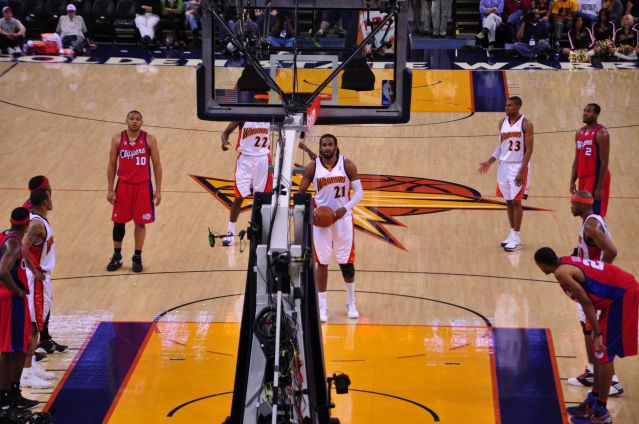
Play
How to Stop Choking Under Pressure
The Psychological Heimlich For Athletes
Posted July 19, 2015

Every athlete in the world from high school to college, from professional to Olympian, one time or another, has choked under pressure. Sometimes, athletes are able to bounce back. Other times, a botched play can haunt an athlete for the rest of his or her career, such as John Carney of the New Orlean Saints’ missing an easy field goal which led to elimination from the 2003 playoffs or when 88 percent free-throw shooter Dirk Nowitzki of the Dallas Mavericks missed a necessary second free-throw and lost game 3 of the 2006 NBA finals, ultimately losing the championship.
“Choking,” as many already know, is a drastic decline in performance in any high stress situation. It’s when an athlete becomes overly concerned with the outcome that they switch off their mental “auto-pilot.” For the non-athletes reading, recall the last time you drove a car. Chances are, you weren’t concerned with the precise angle of the steering wheel, your exact alignment in the lane, or nervously trying to anticipate what the car in front of you was trying to do. But at one point, in driver’s ed class, you did. You jerked the car around, erratically braked, and were, well, bad. In the vast majority of performances, from throwing a baseball to driving a car, there’s a direct correlation in our ability to not think and our ability to perform well. Choking is what happens when you forget to stop thinking and start crumbling under pressure.
Take, for instance, a study at Arizona State University that wanted to see how expert and novice athletes dealt with distraction. In one experiment, a tone was played while the athletes were trying to hit a baseball and the batters were then asked to identify if the tone was high or low. For the novice athletes, this obvious distraction significantly decreased their performance. But the expert batters performed just as well, despite the obvious distraction. However, a different experiment found that when participants were asked to focus on their actions (they were asked to describe the motion of the bat when another tone went off), novices were unaffected but the expert batters performed worse. The researchers even noted that the more the expert batters accurately described the bat motion, the less likely they were to hit the ball.
Let’s deconstruct these findings. The expert batters performed worse at the second test because they were being asked to overtly think about their actions. But hitting a ball, even for the best athletes in the world, is largely muscle memory. Suddenly, when they tried to decipher what their body was doing, their expertise disappeared. Meanwhile, when asked to put their minds to an entirely external task, like identifying a sound, they were just as capable - their bodies were still on auto-pilot. The researchers also found that when they put external pressure on the athletes (a cash reward for improving their performance), the expert batters did their best. Pressure isn’t a bad thing, it’s how we react to it that can be maladaptive. Do we stay calm and collected, or start to overthink our performance?
So how can you stop choking when under pressure? Here are some tips:
Slow down the game by taking your time.
A study which examined the film footage of 400 penalty kicks in professional soccer games noticed that players who took less than a second to place the ball down scored only 58% of the time while those players who did not rush and took longer than a second scored 80% of the time.
Despite the fact that not choking involves not thinking, clearing your mind often, paradoxically, involves a deliberate routine. Pitchers may check the bases, regardless if any players are on them, before a pitch. Basketball players may dribble a certain way, or throw the ball up in the air, before taking a free throw. When you rush into any of these scenarios, you hamper your body's ability to go into auto-pilot, and thus increase your chances of choking.
Play like you don’t care.
I often tell athletes to separate the process from the outcome. The more we fixate on the outcome, whether or not a play was executed properly, whether or not the other team is ahead or not, the more likely we are to choke up. Athletes need to both play as if they don’t care about the outcome while simultaneously giving the game their all.
Tell yourself you can do it.
Confidence is the foundation of many mental skills for performance. If you’ve lost confidence, not only will your overall performance decline, but you’re far more likely to choke up. For most elite athletes, the ability to remain mentally tough and maintain confidence is the one skill that puts them ahead of the rest.
Repeating positive statements about yourself has been shown to decrease the likelihood of losing your confidence, which can keep you focused throughout the game. Remember, the statements should be based on fact. It’s not just positive thinking that helps, it’s positive statements that are true. "I’ve succeeded in this situation before” (if you have!) is a much more effective self-statement than, “I can do this!”
Take your time, practice a positive inner dialog to be more confident and just play to enjoy the game. These steps may seem simple but can massively improve any player’s results.
For more on sport psychology, follow Dr. Fader on Twitter and Facebook.



